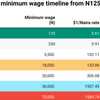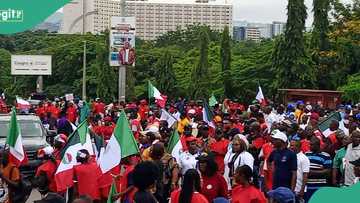
Minimum Wage
As of January 2025, Nigeria's national minimum wage stands at ₦70,000 per month, following its approval in July 2024. This increase from the previous ₦30,000 aims to alleviate the economic hardships faced by workers due to rising inflation and the cost-of-living crisis.
State-Level Implementation
While the federal government has set the minimum wage at ₦70,000, some states have gone beyond this benchmark. For instance, Oyo State implemented a minimum wage of ₦80,000 starting January 2025. Similarly, Akwa Ibom and Bayelsa states commenced payments of ₦80,000 in November 2024.
However, not all states have fully complied. In the Federal Capital Territory (FCT), only Abaji, AMAC, and Gwagwalada area councils had implemented the new wage by January 2025, while Kwali, Kuje, and Bwari councils were yet to do so.
Review Period and Labour Demands
The federal government has reduced the minimum wage review period from five years to two years, aiming for more responsive updates in line with economic conditions. However, labour unions, including the Nigeria Labour Congress (NLC) and the Trade Union Congress (TUC), are advocating for annual adjustments to the minimum wage to reflect inflationary trends and safeguard workers' welfare.
Economic Impact
The implementation of the new minimum wage has significantly impacted state budgets. State personnel costs surged from ₦2.036 trillion in 2024 to ₦3.87 trillion in 2025, representing a 90.23% increase. This rise in expenditure has raised concerns about the sustainability of salary payments, especially in states with lower internally generated revenue.
Challenges and Outlook
Despite the wage increase, high inflation rates continue to erode the purchasing power of workers. As of November 2024, Nigeria's inflation rate stood at 34.60%, diminishing the real value of the new minimum wage. Labour unions argue that without regular adjustments, the wage increases may not effectively improve workers' living standards
















